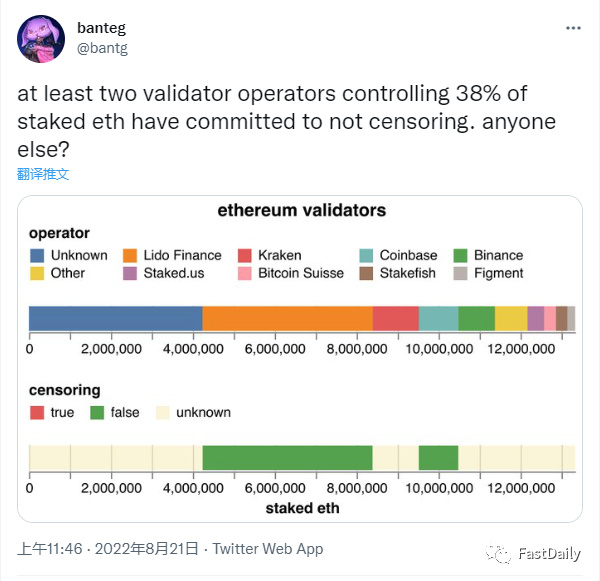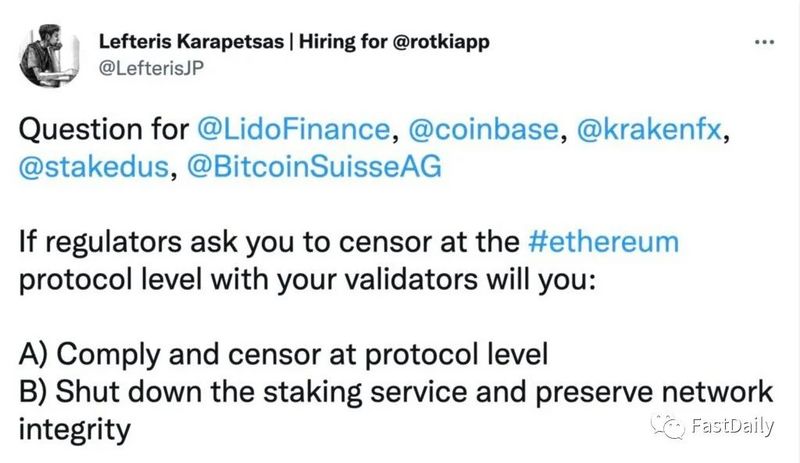The Attitude of Ethereum Validator Node Operators Under the Review Storm
Original Author: Kimming
Original Compilation: Lao Yapi
From the initial Tornado sanctions incident, along with the major DeFi protocols cooperating with U.S. sanctions (front-end blocking of specific addresses), the current debate is whether centralized staking services will eventually start to audit specific transactions after Ethereum's PoS transformation. The community is also debating whether BTC, ETH, or the Beacon Chain is more decentralized and resistant to censorship.

Yearn's core developer banteg shared the current distribution map of validators for BTC, ETH, and the Ethereum Beacon Chain on Twitter. He analyzed that Lido and Coinbase, the two main staking services (about 38%), have committed to fighting against censorship.
So, what other validator nodes, whether based on DeFi protocols or exchanges like Kraken or Binance, can withstand regulation?

The validators of ETH2 are actually quite evidently decentralized, while the crypto community has pointed out several issues:
The combined share of Lido and Coinbase is 38%, which is too high.
DeFi veteran DegenSpartan believes that by 2024, Lido will hold more than half of the market.
What is Lido's commitment to resisting censorship?
Even if ETH2 nodes are decentralized, if they accept censorship in the future, all of this will be in vain.
banteg seems personally confident in Lido and points out that it consists of 30 different validators; Lido's commitment is based on discussions he had with the team. Coinbase's anti-censorship commitment comes only from a tweet response by CEO Brian Armstrong.
Coinbase's Stance
Brian Armstrong stated that he would rather shut down the company's Ethereum staking service than comply with government orders to censor sanctioned transactions.
"This is a hypothetical we hope we don't actually face. But if we have to choose, I think we would choose B." Brian Armstrong responded on Twitter to Rotki founder Lefteris Karapetsas, who asked whether Coinbase and its peers would face pressure from regulators to censor or exit the staking business.
"We must look at the big picture. There may be better options or legal challenges that can help achieve a better outcome," Brian Armstrong continued.
Coinbase accounts for about 14% of all ETH staked, locking over 1.9 million ETH for its users in the Ethereum network's Beacon Chain.
Aftermath of Tornado
The sanctions imposed on Tornado Cash and the subsequent arrests of developers who contributed to its code have sparked an existential debate within the Ethereum community. Notable members are calling for billion-dollar players like Coinbase to take a stand.

"You have a job to do, which is to resist censorship," former Ethereum core developer Lane Rettig wrote in a tweet to the Ethereum community. "The only thing that makes all the pain worth it is all the annoying, slow, painful decentralized theater. If you can't do that, then it’s meaningless, and we should all pack up and go home."
Concentration of Power
Four entities—Lido, Coinbase, Kraken, and Binance—control about 60% of staked ETH to secure Ethereum's Beacon Chain, which runs in parallel with Ethereum's current proof-of-work (PoW) chain (PoS). When the two merge—the long-awaited event currently scheduled for mid-September—the Beacon Chain will effectively absorb the proof-of-work chain, reducing Ethereum's energy consumption by over 99%. But this will also theoretically grant major staking entities the power to refuse certain transactions.
Karapetsas posed a question to Lido, Coinbase, and other major Ethereum 2.0 staking service providers. If regulators require them to censor Ethereum transactions, how will they choose:
[A] Comply with regulatory demands.
[B] Exit the staking business to "maintain network integrity" and incur billions in capital losses in the process?
"If any of them choose [A], we should actively work to distance ourselves from them, as they pose an existential threat to the network's permissionless nature," Lane Rettig wrote in a subsequent tweet.
This question sparked a heated, multifaceted debate—will regulators really do this? Can they? What will Lido, Coinbase, and other staking entities do? And perhaps most importantly: if they do comply, how will the community respond?
Crypto lawyer Geoff Costeloe stated that centralized staking entities have no choice but to comply with government censorship orders.
"These are not individuals. They are entities with shareholders and obligations to profit," he wrote on Twitter. "The real question is only when [A] is not more profitable than [B] (or similar)."
Luke Youngblood, a developer for the DeFi protocol Moonwell participating in Coinbase's ETH staking service, disagreed with this statement.
"One thing you may not know is that all Coinbase retail Ethereum validators operate outside the U.S. (for tax purposes). Therefore, they not only have to fight against censorship but for U.S. regulators, censorship is just a possibility."
Censorship Penalties
However, according to media reports, if Coinbase and the company do comply with censorship rules, the Ethereum community will have no choice but to opt for a "user-activated soft fork" or USAF.
According to Twitter personality and self-proclaimed Bitcoin developer Eric Wall, such a move would "eliminate any interests of entities systematically censoring at the base layer to comply with government regulations."
In a series of call-to-action posts, Wall urged his followers to pressure major stakeholders to combat censorship.
USDC Veto Power
Blake West, co-founder of Goldfinch, believes that given its importance in the ecosystem, the issuer of the USDC stablecoin, Circle, effectively has veto power over Ethereum. To illustrate his point, he cited attempts to keep Ethereum's proof-of-work (PoW) chain alive after The Merge.
Miners, who today contribute significant computing power to protect Ethereum, will find their expensive mining equipment useless after the merge and are committed to "forking" the network—in other words, copying and pasting the currently existing Ethereum Square and continuing to operate it as if nothing has changed.
West believes such efforts will prove futile.
"When [proof of work] forks go live, the supply of USDC will immediately double—at least on-chain," he wrote. "Of course, the dollar backing in Circle's bank account won't. So Circle must choose one and only one chain. They chose the proof-of-stake (PoS) chain. This alone kills the PoW fork. Because if USDC's value drops to zero immediately, the on-chain state will become chaotic."
Blockworks research analyst Matt Fiebach believes this could trigger a counter-censorship from the U.S. Air Force.
"Will Circle (USDC) support a censored or uncensored chain?" he pondered on Twitter. "If they (possibly) choose a censored chain, then we might be messed up by participants supporting a permissionless vision."
Previously, Vitalik Buterin stated that if Ethereum nodes were censored, such as those from Lido and Coinbase, he would view it as an attack on ETH.










